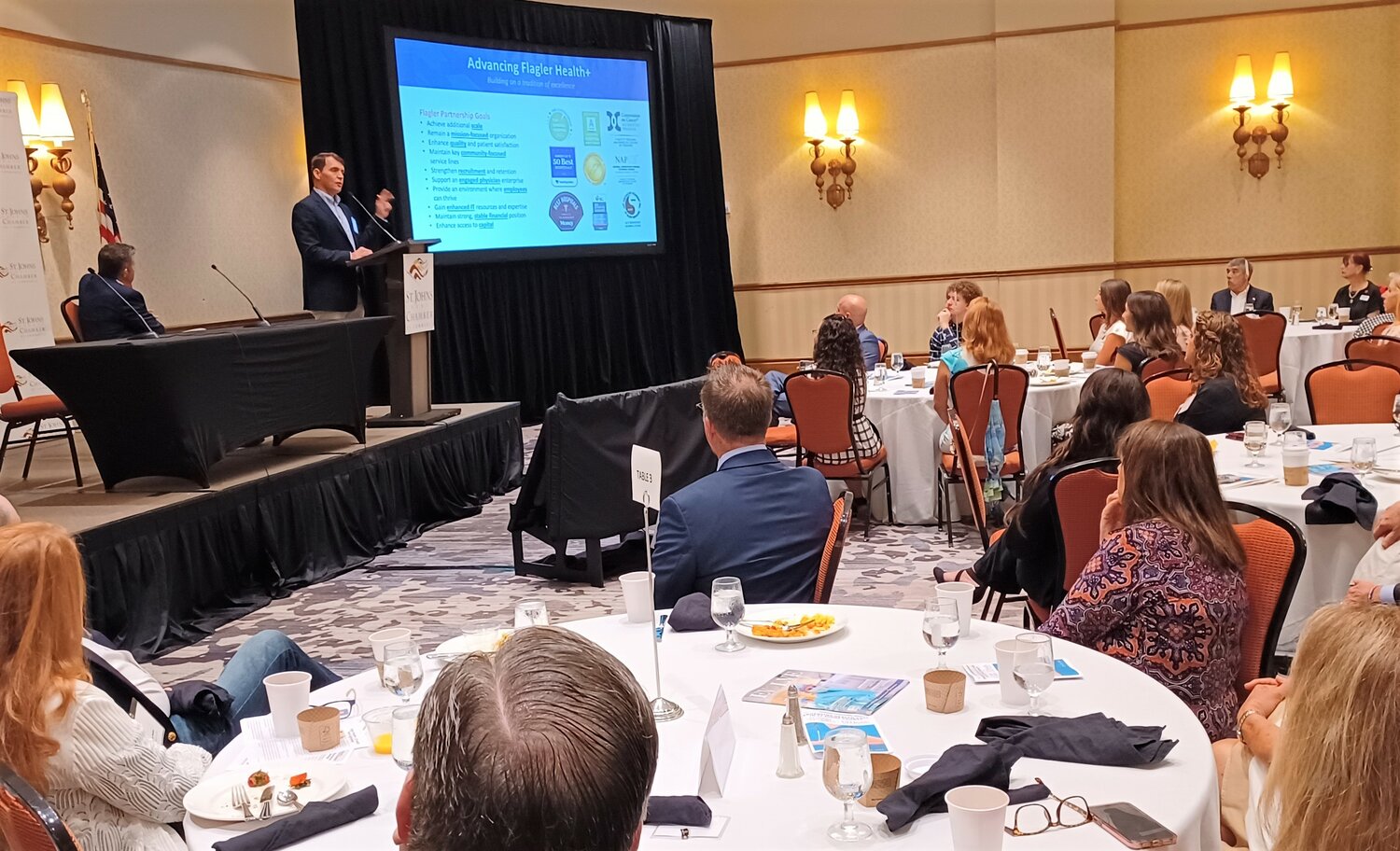Flagler Health+, UF Health presidents address partnership
With the completed integration of Flagler Health+ into UF Health still more than two months away, the first public discussion by their respective presidents was understandably general and limited in detail.
As Flagler Health+ President and CEO Carlton DeVooght put it: “We do have some competitors in the room, and we just don’t feel it’s appropriate to give them the playbook before the game starts.”
The “room” was a large meeting space at World Golf Village Renaissance St. Augustine Resort, every seat taken for the Friday, June 16, event, the St. Johns County Chamber of Commerce Economic Development Quarterly Breakfast.
Sensitive details aside, DeVooght and UF Health President David R. Nelson did offer attendees a look at the arrangement’s process and some of the benefits it is expected to generate for the region, including what might be considered “game changers” for the local health care landscape.
“UF is excited to partner not only with Flagler Health+ but with St. Johns County,” Nelson told his audience, all Chamber members or their guests.
The plan was first announced in February and a definitive agreement was reached in May. But even before that, the two health care entities had announced plans in December 2021 to collaborate on an expansion of graduate medical education programs and clinical services, including new primary care sites in St. Johns and Flagler counties.
DeVooght, appointed president and CEO in March 2022, was just three months into his new job when he spoke with the Flagler Health+ Board of Directors about the need to join a like-minded health system to help enhance local health care services and expand access to care.
The executive team put together an RFP (request for proposal) setting forth several goals that included: growing to meet the needs of the community, enhancing quality and patient satisfaction, maintaining key community-focused services, strengthening recruitment and retention, gaining enhanced information technology resources and expertise, maintaining a strong financial position and enhancing access to capital.
Some of these goals were connected.
“In order to grow, we had to have access to capital markets,” said DeVooght. That meant having a partner with greater scale. In this regard, UF Health, a $5 billion organization, would be an ideal partner.
Regarding the desire to strengthen retention, Flagler Health+ saw immediate results at a career fair in Gainesville following the announcement of the planned integration. Typically, the hospital system could expect three nursing students to express interest.
“After this announcement, we received 34 resumes from nurses that will be joining our team,” DeVooght said.
The arrangement will help “plug a hole” along the I-95 corridor in St. Johns County where access to a nearby, full-service hospital has not kept pace with the influx of new residents. This would include Nocatee.
A key part of that strategy will be the completion of the Flagler Health+ Durbin Park campus, which will feature an acute-care hospital, an outpatient surgery center, medical offices and more on its 42.5-acre campus. Ground was broken for that project in June 2021, and it was initially expected to be completed in three phases over a six-year period.
“We’re still going to need a lot of input from the community,” Nelson said. “What are the services that you would want to see? That’s a conversation that’s coming soon.”
With the inclusion of the Flagler Health+ facilities, UF Health will have a contiguous hospital presence from Halifax Health | UF Health Medical Center of Deltona all the way north to UF Health Wildlight in Nassau County.
A benefit to Flagler Health+ will be investment by UF Health in existing hospital facilities and equipment and a commitment to complete projects currently under way.
“One of the things we promised when we came to the table is to invest, invest not only in the St. Augustine campus but the Flagler footprint,” said Nelson.
This also means the introduction of medical training programs, new electronic health records and full connectivity across the whole system.
But one thing the changes will not include is replacing local doctors with those from UF Health, according to Nelson.
An area of interest for the prospective partners is the creation of “neighborhood hospitals,” which can save patients money and drive time when the needed care does not demand seeking it in a standard emergency department.
One service Nelson hopes to bring to St. Johns County is a mobile stroke treatment unit.
“We have made the commitment to put one in every one of our facilities,” Nelson said.
UF Health currently has one in Gainesville and is planning one each in Jacksonville and The Villages.
Basically, this neurologic ICU on wheels staffed with a team of experts in constant contact with a neurologist via telemedicine responds to a 911 call where stroke is suspected. The speedy response is critical; every minute a stroke is untreated, 2 million brain cells are lost.
“If you can get somebody this kind of treatment within one hour, the likelihood is they will walk out of the hospital with no function deficits,” said Nelson.
But these $1.5 million mobile units don’t make money, which is the reason there are only 19 nationwide. So, UF Health seeks to partner with donors willing to help fund them.
Once the health systems’ arrangement is completed in early September, officials can begin working toward bringing a mobile stroke unit to St. Johns County.
Both DeVooght and Nelson expressed optimism for the new arrangement between their respective health systems and how it will benefit the area.
“This is a day where all the health care providers in this community are going to take a step up,” said DeVooght.







